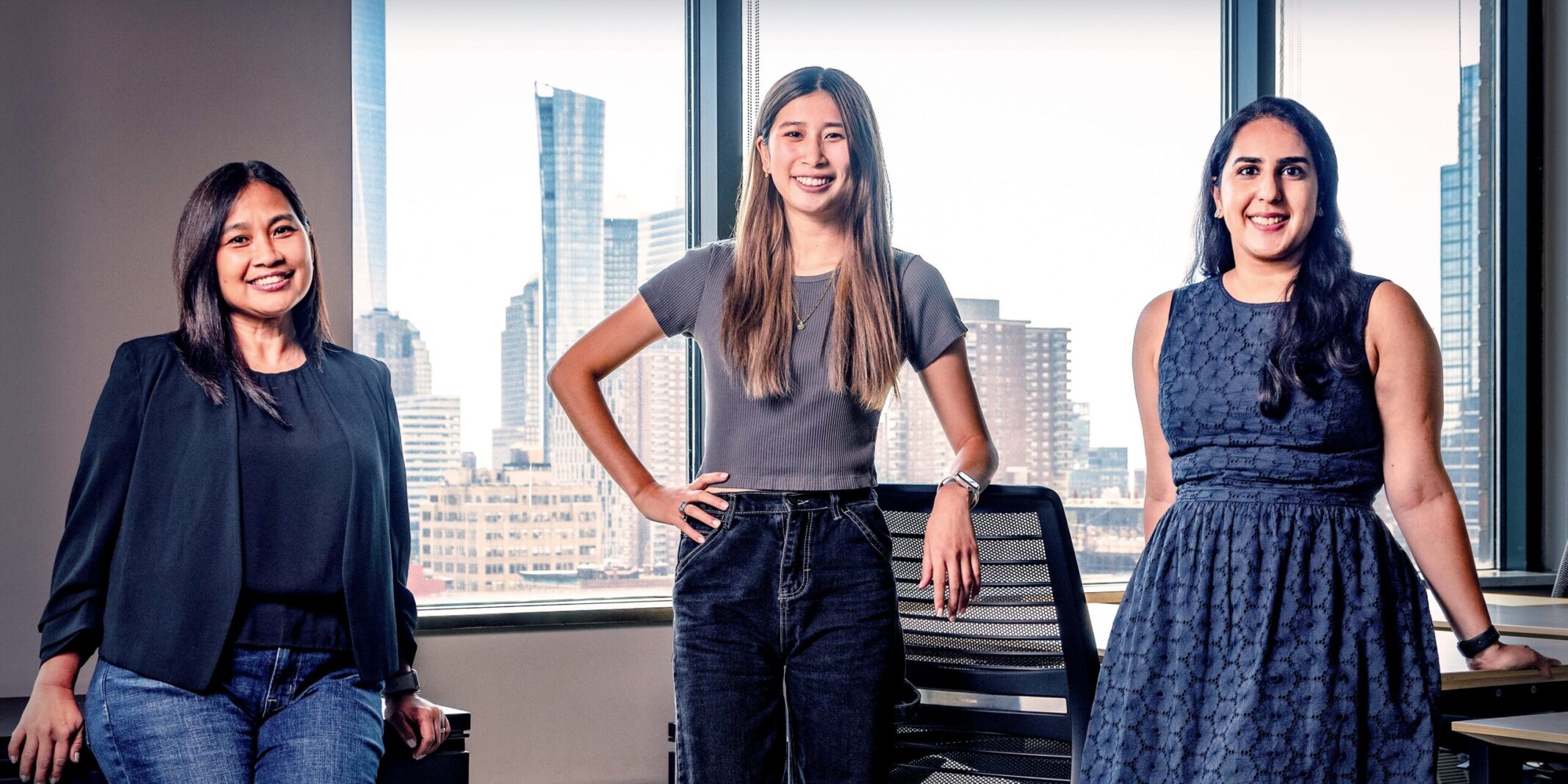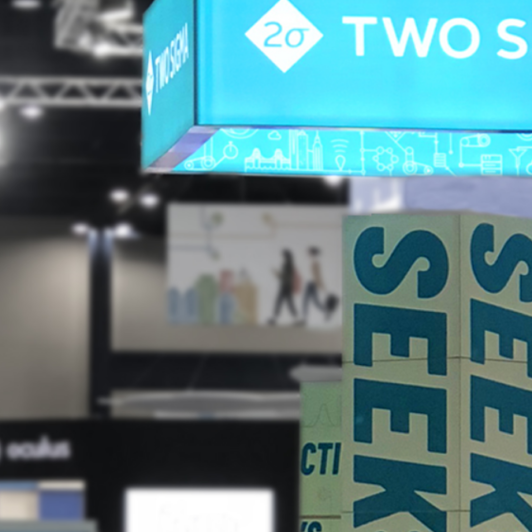Two Sigma has long supported AnitaB.org’s mission – to work toward “a future where the people who imagine and build technology mirror the people and societies for whom they build it.” In fact, 2023 is the 10th year in a row that we’ve sponsored and attended the Grace Hopper Celebration honoring the careers and contributions of women in computing.
An important part of GHC’s purpose is to increase women’s representation in tech and support their career development, goals that closely dovetail with Two Sigma’s own workforce priorities. And one way to help support the professional growth of women in tech is through sharing knowledge and experience.
To that end, in this article we ask several Two Sigma engineers who have attended in previous years (some of whom are also attending in 2023) about their jobs and career journeys, the best career advice they’ve ever received, and the most helpful lessons they can pass on to women just starting out in engineering.
We also ask them to take Two Sigma’s just-for-fun Problem-Solver Type quiz honoring five pioneering women in science who inspire us with their approach to challenging the status quo and solving hard problems. Read on to learn more.
What’s your role at Two Sigma?
 Ris: I manage our Simulation and Analysis platform. My team delivers software products that allow our researchers and portfolio managers to answer questions about how their research ideas will behave in production.
Ris: I manage our Simulation and Analysis platform. My team delivers software products that allow our researchers and portfolio managers to answer questions about how their research ideas will behave in production.
I’ve been at Two Sigma for nine years (time flies!) and have had a few different roles. I worked as an individual contributor (IC) software engineer for the first 10 years of my career, and moved into engineering management in 2016. Now, I manage three teams across New York and London. I am also a founding member of our Women at Two Sigma employee resource group.
 Lade: I’m a platform engineering product manager at Two Sigma, specifically responsible for our Storage Products and Infrastructure. Prior to this role, I led the Services Engineering Product Management team, where I looked after the products and tools that improved developer productivity at Two Sigma and enabled them to build, deploy, and operate services and applications efficiently.
Lade: I’m a platform engineering product manager at Two Sigma, specifically responsible for our Storage Products and Infrastructure. Prior to this role, I led the Services Engineering Product Management team, where I looked after the products and tools that improved developer productivity at Two Sigma and enabled them to build, deploy, and operate services and applications efficiently.
 Mae: I am currently the head of Critical Applications and Data Reliability Engineering. I am relatively new in the role, having taken it on four months ago. Prior to this role, I was head of Collaboration and Productivity Engineering. In addition to my Engineering responsibilities, I am also an executive sponsor of Bridging Ethnicities at Two Sigma (BE@TS) and a member of the DEI Council.
Mae: I am currently the head of Critical Applications and Data Reliability Engineering. I am relatively new in the role, having taken it on four months ago. Prior to this role, I was head of Collaboration and Productivity Engineering. In addition to my Engineering responsibilities, I am also an executive sponsor of Bridging Ethnicities at Two Sigma (BE@TS) and a member of the DEI Council.
 Katherine: I am a software engineer on the Feature Engineering team at Two Sigma. I started here in the summer of 2021, after graduating from college.
Katherine: I am a software engineer on the Feature Engineering team at Two Sigma. I started here in the summer of 2021, after graduating from college.
 Aditi: I’m a security engineer at Two Sigma. I’m responsible for helping secure the software that Two Sigma creates. I do this by supporting engineering investments and engaging in strategic partnerships and services. I provide security requirements and best practices for development environments and SDLC workflows.
Aditi: I’m a security engineer at Two Sigma. I’m responsible for helping secure the software that Two Sigma creates. I do this by supporting engineering investments and engaging in strategic partnerships and services. I provide security requirements and best practices for development environments and SDLC workflows.
You’ve taken our Problem-Solver Type quiz. What type are you? How does this type show up in your work?
Ris: I’m a Creator! According to the quiz, “Creators are powerful builders. They are able to clearly articulate problems and strategize an approach, which enables them to arrive at novel solutions.”
My job is all about articulating problems and strategizing novel solutions. People tell me that I’m good at explaining things. I think this is because I tend to explain things, even complex concepts, in simple terms. To be able to explain something in simple terms, you have to really understand what you’re talking about; and that is something I strive for daily.
It takes a fully informed team working together to analyze, plan, and execute.
Being able to fully communicate a concept makes it that much easier for everyone to understand. And that is important, because strategies are rarely a one-person effort! It takes a fully informed team working together to analyze, plan, and execute.
When I’ve ensured that the concepts are well understood by all, we can strategize together with the freedom to approach the problem from all angles and, bringing all of our various skills to bear, be creative with our problem solving.
Lade: I’m a Creator, too. As a product manager, it is my responsibility to understand the business; our users’ requirements, pain-points, and unmet needs; and their user experience, as it relates to how they interact with our products. By analyzing both user input and business requirements, I identify the gaps in our existing products and define the vision and roadmap to address these requirements. I lean into my creative strength to design the product or feature specification that addresses both business and user needs, and in some cases, I create UX mockups for better user experience.
Mae: I took the quiz twice, and I got Visionary and Questioner. Due to the nature of my team (Critical Applications and Data Reliability Engineering), which has a lot of support-based responsibilities, there is a potential to be very reactive. Being a Visionary allows me to frame things in the context of the big picture and long-term goals, so that even reactive tasks are done in a way that progresses towards those long-term goals.
At the same time, I tend to ask a lot of questions. It helps me understand how everything currently works, and discover new ways of doing things and opportunities to be better. Also, I get to know my colleagues, which makes for a more collaborative work environment.
Katherine: Visionary. The quiz describes a Visionary as someone who “reveals insights and see(s) patterns in areas that may seem random to others.” When I receive feature requests and use my own developed tools, I try to see patterns in what is needed and then prioritize from there.
Aditi: I’m a Visionary, too. I notice myself seeing patterns in areas that seem random to others when I’m working with different teams across the organization and start to notice similarities among the problems we are trying to solve together. Once I pick up on that commonality, I can implement a solution that will work for all the teams involved.
What’s the best professional advice you’ve ever received?
Ris: “Step outside of your comfort zone, and your comfort zone gets bigger.” I’ve had a number of opportunities in my career that I was hesitant to reach for, unsure if I would be able to live up to whatever people thought they saw in me that made them offer me the opportunity in the first place.
When considering a particularly challenging role at Two Sigma, I directly vocalized this fear to my soon-to-be manager. He said, “Good! If a new job doesn’t scare you a bit, it’s not enough of a stretch and isn’t worth taking.” That job ended up being a tremendous learning opportunity that helped to propel my career forward rapidly. Now, I am more comfortable feeling uncomfortable, and when I do feel that way, I trust that I’m growing and learning.
Don’t say “no” to yourself before others say “no” to you. Believe in yourself, move in confidence. Make your voice heard!
Lade:
- Feedback is a gift. It is one of the most important career data-points required for growth. Also, do not be defensive when receiving constructive feedback, it’s the fuel that you need to reshape any negative perception.
- Focusing on weaknesses keeps you in your fear zone, where you are constantly thinking about what may be “wrong” about you. Focus on your strengths instead!
- Don’t be afraid of being referred to as “loud.” Own your accomplishments.
- Don’t say “no” to yourself before others say “no” to you. Believe in yourself, move in confidence. Make your voice heard!
Mae: Self-awareness is key – be open to feedback (and act on it), but know your value.
Katherine: Don’t be afraid to ask questions! I’m super grateful for how people at Two Sigma are so responsive and happy to help.
Aditi: I’ve received two great pieces of professional advice: The first is that I am the best advocate for my career. While others may invest in me and support me throughout my career, at the end of the day, I’m the only one who knows what is best for me and has my best interests in mind.
The second is to always run toward something (a project, role, opportunity, etc.), not away from it. Make sure you’re focusing on the opportunity, and how the opportunity benefits you, to keep progressing in your career.
What advice would you give to a software engineer who’s just starting her career?
Ris: Ask more questions than seems reasonable. You don’t ever need to pretend to know something you don’t actually know, and being open to the fact that you don’t know everything will allow you to learn and get you much further in your career. If the answer doesn’t make sense to you, say so, and ask the same question again and again until you do understand.
Ask more questions than seems reasonable.
Lade: As you start out your career in software engineering, cultivate technical depth, critical thinking, and problem-solving capabilities. Yes, it’s a mouthful. However, these three components are fundamental for developing a multi-hyphenate career path and trajectory that software engineering skill set offers!
Mae: Never stop learning. Have a trusted network.
Katherine: Don’t worry if you feel overwhelmed or “behind”—you’re not. Just try your best, seek resources, and ask questions when you are lost. Also, take time to familiarize yourself with your new work environment. I found myself much more comfortable at work after meeting my teammates, coworkers, and other new starters.
Aditi: My advice to someone starting out as a software engineer is to network and talk to people about their work, and try to be as hands-on as possible. Sometimes it will be hard, as all new things are at first. But, it’s important to remain positive and not to be intimidated. Remind yourself that you have the skills to overcome any challenge. Be confident, believe in yourself, and trust your intuition.
At Two Sigma, we think of ourselves as “hypercurious”—intensely driven to question and explore. What are you hypercurious about?
Mae: I am hypercurious about how systems, data, and people work together, and how our ecosystem functions as a whole. The systems and data are our bread-and-butter, and the people who build, run and use them are critical to our success. Knowing more about all these perspectives helps me plan and run my day-to-day work.
Aditi: I am hypercurious about the cloud! I love learning about all the benefits that cloud computing provides for software development and the impact cloud services have on how we think about designing secure and resilient architecture.
What’s on your work playlist these days (whether working from home or in-office)?
Ris: I don’t actually listen to a lot of music while I’m working, but my playlist for running is a smattering of different songs I know and love in every genre, from pop to folk to metal to hip hop, and lately I’m getting into EDM a bit.
Mae: Classic rock (Billy Joel, Phil Collins, Eagles).
Lade: John Coltrane, Miles Davis, Gregory Porter, Anita Baker, and some Afrobeats tunes by WizKid, Davido, Asake, et al.
Katherine: I like to play the Daily Mixes on Spotify, which often tend to be R&B or J-pop.
Aditi: I’ve been listening to a lot of Broadway soundtracks these days, specifically the soundtrack for Six the Musical and Hamilton.
Attending GHC 23? Stop by and say hello!
To learn more about working at Two Sigma and find open roles, be sure to visit our Careers page. And if you are going to Grace Hopper Celebration in Orlando this year, be sure to stop by booth 333 to say hi (and pick up some swag). We’d love to get to know you!






